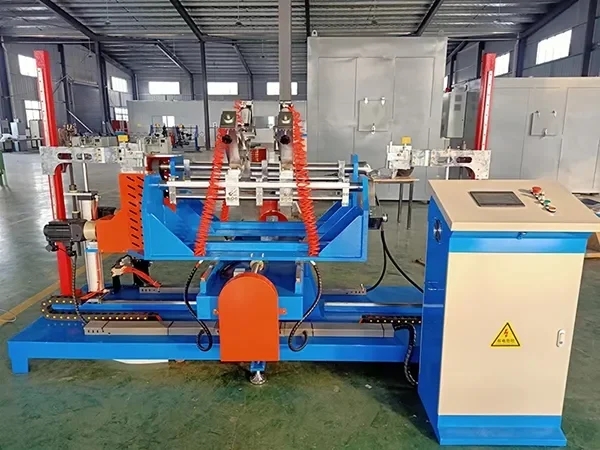Zirconium Pressure Vessels: The Pinnacle of Corrosion Resistance in Industrial Applications
3 min readPressure vessels are essential to industrial operations, providing safe containment for gases, liquids, and other substances under high pressure. When choosing materials for pressure vessels, factors such as durability, corrosion resistance, and high-temperature performance are critical. Among the various materials available, zirconium has proven to be an excellent choice for constructing pressure vessels, particularly in environments where aggressive chemicals are present. In this article, Qiwei will explore the characteristics of zirconium pressure vessels. With its exceptional corrosion resistance, high strength, and reliability, zirconium has become indispensable in sectors where other materials may fall short.
What are Zirconium Pressure Vessels?

Zirconium pressure vessels are specialized containers made from zirconium or zirconium alloys, designed to safely hold gases or liquids at high pressure. Zirconium is a unique material known for its exceptional resistance to corrosion, particularly in highly aggressive chemical environments. This makes zirconium pressure vessels ideal for use in industries where conventional materials, such as stainless steel or carbon steel, may corrode or degrade rapidly.The primary function of pressure vessels is to contain pressurized fluids, gases, or chemicals in a secure and controlled manner. Zirconium pressure vessels are particularly useful in applications involving corrosive substances like hydrochloric acid, sulfuric acid, and other harsh chemicals. Their ability to withstand extreme conditions without suffering from corrosion, embrittlement, or mechanical failure sets them apart from vessels made of other metals.
Characteristics of Zirconium Pressure Vessels
Zirconium pressure vessels are recognized for their unique properties, making them suitable for highly corrosive and demanding environments. Below are some of the defining characteristics of these vessels:
Exceptional Corrosion Resistance
The most prominent characteristic of zirconium pressure vessels is their superior corrosion resistance. Zirconium is virtually immune to most acids, alkalis, and saline environments, where other materials like stainless steel or carbon steel would corrode rapidly. In particular, zirconium pressure vessels can withstand highly aggressive chemicals, such as hydrochloric acid and sulfuric acid, without degrading.This resistance is due to the stable oxide layer formed on the zirconium surface. This layer provides continuous protection, ensuring that the vessel's internal environment does not compromise the material's integrity. The result is longer service life, fewer maintenance interventions, and a higher level of safety when compared to other materials.
High-Temperature Performance
In addition to corrosion resistance, zirconium pressure vessels offer excellent performance at high temperatures. In many industrial processes, pressure vessels are subjected to not only high pressure but also elevated temperatures. Zirconium, with its high melting point and thermal stability, performs well in these environments, maintaining both structural integrity and corrosion resistance even under extreme conditions. Zirconium's high-temperature performance is particularly advantageous in applications such as nuclear reactors, where heat and radiation pose significant challenges. Zirconium alloys are also commonly used in heat exchangers and chemical reactors, where both thermal efficiency and resistance to aggressive chemicals are required.
High Strength and Durability in Harsh Conditions
Zirconium pressure vessels possess the mechanical strength required to operate safely in high-pressure environments. This strength, combined with its corrosion resistance, ensures that the vessels can handle the stresses associated with high-pressure chemical processes without failure. Additionally, zirconium alloys such as Zr 705 provide enhanced mechanical properties, allowing for even greater durability under extreme conditions.
Excellent Heat Transfer Properties
In many industrial applications, the efficiency of a pressure vessel is tied to its ability to transfer heat effectively. Zirconium pressure vessels offer excellent heat transfer properties due to the material's relatively high thermal conductivity. This allows for efficient heat exchange, which is critical in processes such as chemical reactions and heat recovery systems.For example, in industries that use pressure vessels as part of a heat exchange system, zirconium's ability to efficiently transfer heat ensures that processes remain energy-efficient while maintaining product quality. This is particularly important in industries such as pharmaceuticals and petrochemicals, where temperature control is essential.
Zirconium pressure vessels represent the pinnacle of corrosion resistance and durability in the most demanding industrial applications. Their unique properties, including exceptional corrosion resistance, high mechanical strength, excellent heat transfer, and resistance to hydrogen embrittlement, make them an invaluable asset in industries such as chemical processing, pharmaceuticals, nuclear energy, and oil and gas. By ensuring longer lifespans, reduced maintenance, and improved safety, zirconium pressure vessels offer a reliable solution for handling aggressive chemicals and extreme conditions, setting a high standard for performance and efficiency in industrial operations.
https://www.tnztn.com/Zirconium-Pressure-Vessel
www.tnztn.com
Wuxi Qiwei Nonferrous Technology Co., Ltd.



